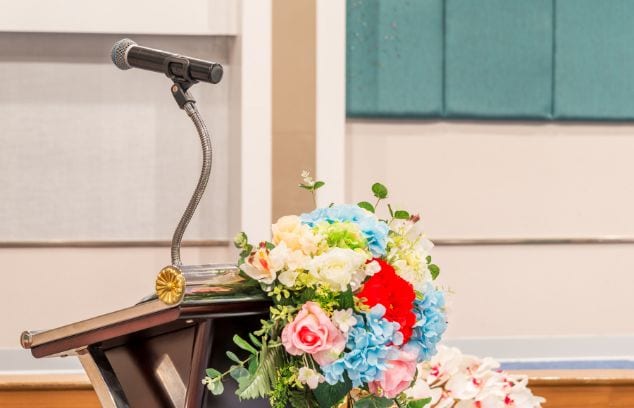10 Tips for Giving and Delivering a Memorable Eulogy

3 Ways To Frankly Explain Cremation to a Child
November 29, 2022
Simple Funeral Decorations To Make It Memorable
December 12, 2022A huge responsibility hangs over the head of the one designated to deliver a eulogy in the remembrance of a departed family member, friend, or member of the community. Time and effort are needed to research the individual by speaking with those who knew them and those who may have written about their achievements. Getting this information allows the personal testimonies to present themselves through the people that were connected with the deceased. Here are ten tips for giving and delivering a memorable eulogy to make for an easier transition for the family and friends of the loved one who has passed.
Reliving Their Memories
As a pastor or an orator, it is your job to create an environment in which the memory or memories of the departed can fill the air to honor the person you are speaking of. Doing so helps to soften the reality that they no longer live among their peers and loved ones. During this transition, it is important to remain mindful of each individual in the audience so as not to disturb them any more than they already are during this time of mourning. That is why sharing the memories of the departed through storytelling is an ideal way to give a memorable eulogy.
Knowing When To Stop
When you are speaking to the audience, engaging with them is half the battle. You do not want to upset or bore them, so there is a balance of which and how much information to share that you must familiarize yourself with. Once you learn it, you can carry on a conversation without making it painful to hear. Setting the tone and the pace is extremely important when you are eulogizing the life of someone. These factors also make it easier to segway into a conclusion so you do not overdo the speech and keep your audience comfortable.
Have Someone Proofread
Making a speech isn’t much different from writing a paper. It needs to be properly outlined and structured so your thoughts remain organized. This step allows the reader to orate while making the eulogy. You will also need to have someone check your work to avoid any major errors and ensure that what you are saying is clear. The more natural the tone and voice of the piece, the better it will sound to the audience when the time comes for you to read it.
Always Include the Audience
To make things more memorable, it’s always a good idea to include the audience. Including them in your eulogy will create more meaning for them, and the memory of their loved one will carry on in a more positive light. Try to include as many people through stories and connections as you can without going overboard. Doing so will give the deceased’s family and friends something to talk about after the service and into the future.
Engaging the audience in this way makes them feel warm and welcome from the moment you start speaking until the end of your speech. You can accomplish this even more by making eye contact and speaking in a low, gentle tone.
Another way you can carry on their memory is through handouts and keepsakes, such as memorial bookmarks, with the deceased’s obituary on them.
Recite as Many Times as Possible
They say that practice makes perfect; in this case, it could not be more on point. You will want to become not just familiar with your speech but have it carry on in your memory. The more detailed and personal to the family you make it, the easier it will be to remember key points throughout the speech. Reciting your eulogy and having these highlights in mind will help to incorporate your tone throughout the message and create a memorable resonance when you speak on behalf of the deceased.
Start Easy and Gradually Build
Another key factor to remember when giving speeches, especially eulogies, is you want to build up to those key moments throughout the piece to keep your audience engaged. In other words, ensure you’re pacing yourself to keep the mood comfortable. Doing so makes the oration feel more natural to the listener.
Take Your Time Speaking
Just like any sermon or speech, you will need to ensure that you have a certain cadence. Your timing needs to be exact when you want to bring up high and low points. More importantly, this will help generate ease, so you do not speed through the eulogy too fast or drag it out too long. The more you practice your timing, the more natural your eulogy will sound, which will keep your audience listening for the duration of your speech.
Dress for the Occasion
Of course, as pastor or designated orator for the deceased’s funeral, you will need to dress the part. Because funerals are formal events, you will need to dress well. Usually, formal wear is the generally accepted dress for the occasion. After all, you are memorializing the life and death of the deceased, so it will need to be done in an honorable fashion. Mourning traditions also mandate that your attire is primarily—if not all—black out of respect for the grieving family and friends.
Tie in a Positive Note
The most important thing you need to remember when delivering a eulogy is to keep the person you are speaking of at the center. Make the memory of them the majority of everything you talk about, and tie in as much positivity as possible so that you can offer your listeners some feelings of relief before they leave.
We hope our ten tips for giving and delivering a memorable eulogy were helpful—whether you are speaking on behalf of someone or just curious. Whatever the case, you now have the information to make your next speech or sermon memorable. So, make sure you study this post carefully and use it to the best of your ability if you ever find yourself behind a pulpit orating the memory of someone.



